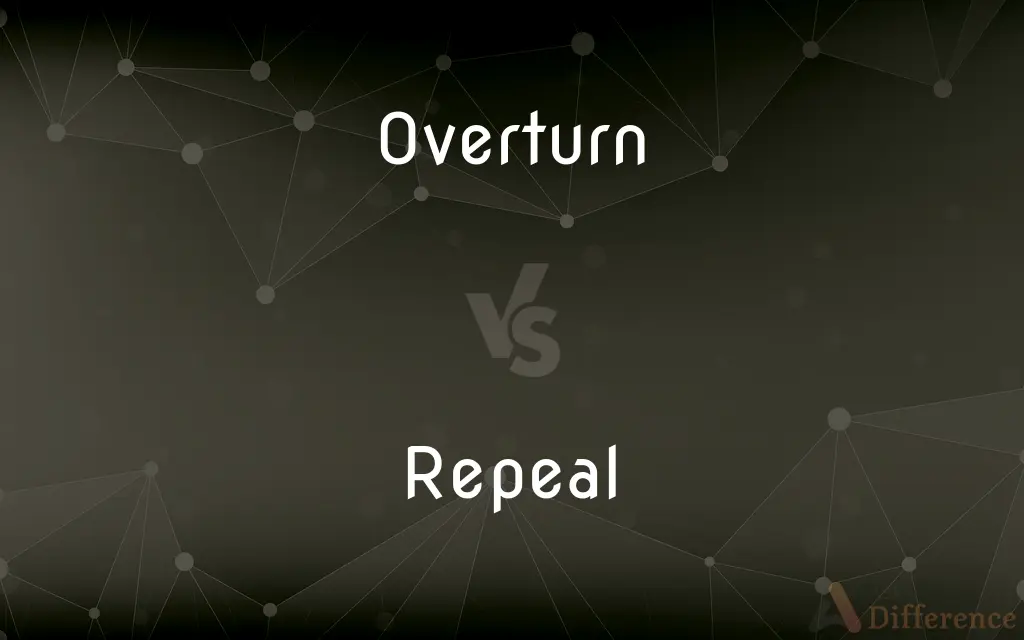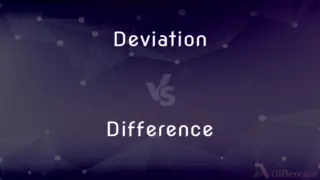Overturn vs. Repeal — What's the Difference?
Edited by Tayyaba Rehman — By Fiza Rafique — Updated on April 21, 2024
"Overturn" typically refers to invalidating a decision or ruling, often used in legal contexts, whereas "repeal" involves formally revoking a law through legislative action.

Difference Between Overturn and Repeal
Table of Contents
ADVERTISEMENT
Key Differences
"Overturn" is commonly used in legal scenarios where a court decision or verdict is invalidated or reversed, often after an appeal. Whereas "repeal" specifically refers to the act of revoking a law or statute, which is usually carried out by a legislative body.
In practice, to overturn is to change a previous ruling, suggesting a corrective action to a potentially erroneous decision. On the other hand, to repeal a law implies a change in public policy or opinion, leading to the removal of the law from the statute books.
Judges or higher courts have the authority to overturn decisions, highlighting its judicial nature. In contrast, repeal is driven by political processes and requires approval from a legislative assembly or similar governing body.
Overturning can be seen as part of the checks and balances in judicial systems, aiming to ensure fairness and justice in legal proceedings. Conversely, repealing laws often reflects shifts in societal values or priorities, affecting the legal landscape broadly.
The impact of overturning a decision is generally confined to the parties involved in the case and possibly influences future legal interpretations. Whereas the impact of repealing a law is widespread, directly altering the legal framework that governs all individuals under its jurisdiction.
ADVERTISEMENT
Comparison Chart
Definition
To invalidate a decision or ruling
To revoke a law or statute
Scope
Judicial decisions
Legislative statutes
Authority
Judicial bodies (courts)
Legislative bodies (parliament, congress)
Primary Impact
Corrects or changes legal rulings
Changes in public policy
Application Example
A court overturning a previous verdict
A government repealing an outdated law
Compare with Definitions
Overturn
To overthrow or undermine.
The rebellion sought to overturn the regime.
Repeal
To withdraw formally from an agreement or commitment.
The country announced its plans to repeal the treaty.
Overturn
To disrupt or invalidate.
New evidence might overturn the established theory.
Repeal
To recall or take back a decision.
The community leaders decided to repeal the earlier curfew.
Overturn
To annul or reverse a decision by a higher authority.
The Supreme Court overturned the previous ruling on the case.
Repeal
To officially revoke a law through legislative action.
The parliament passed a bill to repeal the controversial law.
Overturn
To cause to tip over or capsize.
The sudden storm overturned the boat.
Repeal
To annul or abolish by authoritative action.
The new administration focused on the repeal of old policies.
Overturn
To thoroughly examine and rearrange.
She overturned every drawer in search of the key.
Repeal
To rescind or revoke formally or officially.
The act was repealed after widespread public criticism.
Overturn
Overturn is a video game developed by Japanese company Studio Zan for WiiWare. It was released in Japan on December 2, 2008, in North America on August 3, 2009, and in Europe on February 12, 2010, by Gamebridge as Overturn: Mecha Wars.
Repeal
A repeal (O.F. rapel, modern rappel, from rapeler, rappeler, revoke, re and appeler, appeal) is the removal or reversal of a law. There are two basic types of repeal, a repeal with a re-enactment (or replacement) of the repealed law, or a repeal without any replacement.
Overturn
To cause to turn over; upset or flip over
Large waves overturned the raft.
Repeal
Revoke or annul (a law or act of parliament)
The legislation was repealed five months later
Overturn
To cause to fall over; knock or topple over
Bumped the vase and overturned it.
Repeal
The action of revoking or annulling a law or act of parliament
The House voted in favour of repeal
Overturn
To ransack
Found that the room had been overturned during the night.
Repeal
To revoke or rescind, especially by the action of a legislature.
Overturn
To cause the downfall, destruction, or ending of; overthrow or abolish.
Repeal
(Obsolete) To summon back or recall, especially from exile.
Overturn
(Law) To invalidate or reverse (a decision) by legal means
"his continuing legal battles to overturn a draft-evasion conviction" (Robert Lipsyte).
Repeal
The act or process of repealing.
Overturn
To turn over or capsize
The car went off the road and overturned.
Repeal
(transitive) To cancel, invalidate, annul.
To repeal a law
Overturn
The act or process of overturning
The court's overturn of a ruling.
Repeal
To recall; to summon (a person) again; to bring (a person) back from exile or banishment.
Overturn
The state of having been overturned.
Repeal
To suppress; to repel.
Overturn
The periodic mixing or circulation of water in a lake or sea as a result of changing temperature of its layers.
Repeal
An act or instance of repealing.
Overturn
To turn over, capsize or upset.
Repeal
To recall; to summon again, as persons.
The banished Bolingbroke repeals himself,And with uplifted arms is safe arrived.
Overturn
(transitive) To overthrow or destroy.
Repeal
To recall, as a deed, will, law, or statute; to revoke; to rescind or abrogate by authority, as by act of the legislature; as, to repeal a law.
Overturn
To reverse (a decision); to overrule or rescind.
Repeal
To suppress; to repel.
Whence Adam soon repealedThe doubts that in his heart arose.
Overturn
(transitive) To diminish the significance of a previous defeat by winning; to make a comeback from.
Repeal
Recall, as from exile.
The tribunes are no soldiers; and their peopleWill be as rash in the repeal, as hastyTo expel him thence.
Overturn
(intransitive) Of a body of water: to undergo a limnic eruption, where dissolved gas suddenly erupts from the depths.
Repeal
Revocation; abrogation; as, the repeal of a statute; the repeal of a law or a usage.
Overturn
A turning over or upside-down; inversion.
Repeal
The act of abrogating; an official or legal cancellation
Overturn
The overturning or overthrow of some institution or state of affairs; ruin.
Repeal
Annul by recalling or rescinding;
He revoked the ban on smoking
Lift an embargo
Vacate a death sentence
Overturn
To turn or throw from a basis, foundation, or position; to overset; as, to overturn a carriage or a building.
Overturn
To subvert; to destroy; to overthrow.
Overturn
To overpower; to conquer.
Overturn
The act off overturning, or the state of being overturned or subverted; overthrow; as, an overturn of parties.
Overturn
The act of upsetting something;
He was badly bruised by the upset of his sled at a high speed
Overturn
An improbable and unexpected victory;
The biggest upset since David beat Goliath
Overturn
Turn from an upright or normal position;
The big vase overturned
The canoe tumped over
Overturn
Cause to overturn from an upright or normal position;
The cat knocked over the flower vase
The clumsy customer turned over the vase
He tumped over his beer
Overturn
Rule against;
The Republicans were overruled when the House voted on the bill
Overturn
Cause the downfall of; of rulers;
The Czar was overthrown
Subvert the ruling class
Overturn
Annul by recalling or rescinding;
He revoked the ban on smoking
Lift an embargo
Vacate a death sentence
Overturn
Change radically;
E-mail revolutionized communication in academe
Common Curiosities
What is the difference between overturning a decision and appealing it?
Appealing a decision is requesting a higher court to review it, potentially leading to it being overturned.
What happens when a law is repealed?
When a law is repealed, it is no longer in effect and ceases to be a part of the legal framework.
What does it mean to overturn a court decision?
To overturn a court decision means to invalidate that decision, typically by a higher court.
What are some reasons a law might be repealed?
Laws might be repealed due to changes in societal values, ineffectiveness, or redundancy.
Can executive orders be overturned?
Yes, executive orders can be overturned by the courts if deemed unconstitutional.
Can a repealed law be reinstated?
Yes, a repealed law can be reinstated through the legislative process.
What leads to a decision being overturned?
Decisions may be overturned due to legal errors, new evidence, or changes in law.
How often do laws get repealed?
The frequency of law repeals varies widely depending on the political climate and legislative agenda.
Can any court overturn a decision?
Only appellate or higher courts have the authority to overturn lower court decisions.
Who has the power to repeal a law?
Legislative bodies, such as parliaments or congresses, have the power to repeal laws.
Is repealing a law the same as amending it?
No, repealing a law involves completely revoking it, while amending a law involves making changes to it without fully revoking it.
What is the effect of overturning a Supreme Court decision?
Overturning a Supreme Court decision can change legal precedents and affect national laws and policies.
Are there limitations to what decisions can be overturned?
Generally, only decisions deemed legally flawed or unjust are eligible to be overturned.
What's the public reaction to repealing controversial laws?
Public reaction can vary from support to opposition, often influenced by the nature of the law and its impact on society.
What's the historical impact of repealing laws?
Repealing laws can have significant historical impacts, often reflecting major societal shifts.
Share Your Discovery

Previous Comparison
Kebap vs. Kebab
Next Comparison
Deviation vs. DifferenceAuthor Spotlight
Written by
Fiza RafiqueFiza Rafique is a skilled content writer at AskDifference.com, where she meticulously refines and enhances written pieces. Drawing from her vast editorial expertise, Fiza ensures clarity, accuracy, and precision in every article. Passionate about language, she continually seeks to elevate the quality of content for readers worldwide.
Edited by
Tayyaba RehmanTayyaba Rehman is a distinguished writer, currently serving as a primary contributor to askdifference.com. As a researcher in semantics and etymology, Tayyaba's passion for the complexity of languages and their distinctions has found a perfect home on the platform. Tayyaba delves into the intricacies of language, distinguishing between commonly confused words and phrases, thereby providing clarity for readers worldwide.
















































